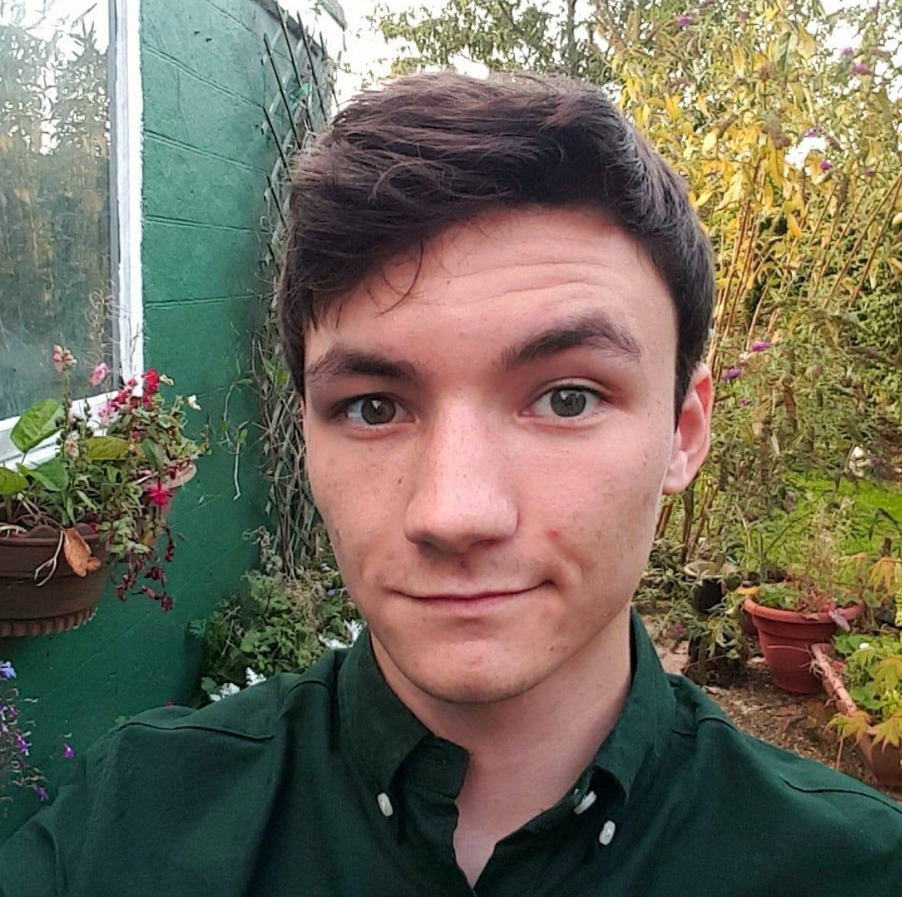-
Blog Views
800
Patchworktogether Spotlight: Will McNally on living with Chronic Fatigue Syndrome
Chronic Fatigue Syndrome (CFS for short) is achronic health condition. Its symptoms include extreme tiredness, sleepproblems, headaches, widespread pain, a sore throat or glands, concentration problems, dizziness, nausea, and palpitations. As an invisible illness which is not widely understood, those who suffer with it can find it an extremely alienating condition.
Recent university graduate Will McNally has been dealing with the symptoms of CFS for five years. We spoke to him to find out how the condition affectshis life and work, and how a platform like Patchwork Hub could help him find community support as well as opportunities.
How long have you had CFS and how long wereyou suffering with symptoms before you were diagnosed?I have been diagnosed with CFS for just underone year, but have been suffering from the symptoms for five years. Thecondition came about as a result of a major operation in 2015 - my body neverfully recovered from the changes and trauma, resulting in extreme fatigue.
Was the diagnosis process difficult?
The diagnosis was made more difficult by thesymptoms and fatigue at first being pinned on the original operation, and thenthe follow-up operation almost three years later. However, the effects neversubsided, and progressively worsened.
What symptoms do you experience, and how doesCFS make you feel?
CFS can have both physical and mental effectsas a result of each other. I average between 8-12 hours of sleep each day, and no matter how much sleep I get or how good the sleep is, I feel exhausted upon waking up and therefore struggle to get out of bed.
On particularly bad days, I have slept for around 16+ hours. The feeling itself is a constant, plaguing fatigue: at no point within the last five years have I felt anything other than tired. It’s a constant feeling that if I were to crawl back into bed at any point during the day, I could, and would, fall back into sleep.
Mentally, it also creates an ongoing mindset of procrastination: I almost always find myself in the mindset of “I’ll do it tomorrow, I’m too tired now”. This can, in turn, be detrimental to my mental health as I’ll feel lazy and unaccomplished, yet still exhausted as if I’d been busy all day.

Do you feel that you and your condition aretaken seriously, not only by medical professionals, but by university staff andemployers?
Not at all. I have never found a workplace or educational institution that has taken this condition seriously, and it is either perceived as laziness or caused by a lack of: iron, vitamins, exercise, healthy eating, a good sleep pattern…You’re therefore deemed unenthusiastic and a liability.
The fact is there is very little I can do to combat these issues - at my busiest period in university, I was working 12 hours a day, every day, and sleeping 12 hours a day (including a nap in the afternoon). I missed out on lectures I deemed not important enough to have to fight this fatigue and get out of bed for, and at many I did go to, I would find myself falling asleep.
Having friends, family, tutors, and healthcare professionals telling me for years that I needed to work harder at getting into a better routine, eating more healthily, exercising regularly, and taking many multivitamins was always infuriating when I knew that over these five years I had done all of the above. I had been the definition of health and peak fitness and yet this condition never lessened, but no one would see it as more than just an adolescent male who slept too much.
Did the condition affect your ability to work and study during your degree?
This condition impacted my education and higher education immensely. I did not spend £50,000 over three years to willingly sleep through lectures and avoid classes for a subject I chose and loved. I was forced to miss out on many workshops and lectures during my course because I just felt too exhausted to leave the house.
My tutors, and my university as a whole, understand the condition so little that they never provided me with any extra support despite my full disclosure of my disability, something that severely impacted me in my hugely busy final year.
What are your most effective coping mechanisms?
The only mechanism I found that had any impact was a daily structure when I was in a position where I needed to be productive.
For example, I used to work at a restaurant where I couldn’t be late or this could reflect badly on me, leading me to ensure I was awake, ready, and at work on time. However, this was unhealthy in a different way as it never stopped my fatigue, and instead I felt as if I was suffering through each shift, just wanting to go home and rest.
Putting yourself in a position where you are so exhausted and want to get more sleep, but panic because you can’t be late to work and get fired, is also terrible for your mental health. Other than this, I have still not found any mechanism that has helped.
What do you wish people understood about you and your condition?
I wish people understood that this condition is not just tiredness, or laziness. I was a teenager who, at some point, did not have this fatigue, and I remember how it used to feel to be exhausted, but feel well-rested after a good night’s sleep. That does not happen anymore.
This is not something I, or anyone else who suffers from it, wants. Nobody wants to be unproductive; I would love more than anything to willingly work off 6-7 hours of sleep, and wake up at 7am to see a full working day. I do not enjoy spending half my life in bed or sleeping, and I wish people wouldn’t view it as something that could be fixed “if I just…”, because the main issue with Chronic Fatigue is that it is a collection of symptoms related to energy levels, tiredness and fatigue that don’t have a clear origin or solution.
There has not been a medical answer that universally works for all sufferers. CFS is not the same as someone having a busy day and feeling very tired, it is fatigue, which means complete exhaustion all the time.
How could a platform like Patchwork Hub improveyour life and job prospects?
There are not many people out there who give this condition the correct support, because of the lack of awareness around it. Having a platform like Patchwork Hub is incredibly useful, as it means you don’t have to explain to employers, tutors, or co-workers that you’re trying really hard, but you just can’t work to the same pace or same time-frames as most others, and need to find a system that fits both parties. Being able to find not only flexible job opportunities, but also a like-minded community, is a gamechanger.
If you suffer, or think you might be suffering,with CFS, you can find information and support at The ME Association.
Tags
All Tags
Ability Connect Academy for Disabled Journalists Academy for Disabled SEO Specialists Access2Funding Accessibility Accessibility information Accessibility int he workplace Accessibility ramps Accessible education Accessible locations Accessible places Acid reflux Adaptive fashion Advocacy AI Aleto Foundation All Saints Alt text Aspiring Entrepreneurs with Disability Development Programme Assistive technology Autism Awareness Barriers Beth Kume-Holland Blog Budgeting Bullying BUPA Burnout Business Business Disability Forum Business model creation Business skills Business workshop Businesses Cancer Candidates Captions Cash flow Cerebral palsy Characters Charity Charity sector Chronic pain Closed captions Clothes Clothing Cognitive disabilities Comfort zone Communication Community networks Companies Company Company Corner Company culture Confidence Confucius Consultant Consultation Content creator Content designer Data talent Diagnosis Difference Digital and social media marketing Digital transformation Disabilities Disability advocate Disability advocates Disability and Neurodiversity Network Disability awareness Disability Awareness Training Disability community Disability confident Disability Confident Leader Disability employment Disability inclusion Disability news Disability Policy Centre Disability Pride Disabled Disabled candidates Disabled community Disabled founders Disabled people Disabled People’s Direct Action Network Disabled talent Disabled team Disabled-led Diverse Diverse workforce Diversity Diversity and inclusion Diversity Project Diversity Recruitment Platform Domestic violence Dysfluency ED&I EDDP Education Education and resource platform Employment opportunities Employment platform Empowerment Equality Act 2010 Ethnic minorities Eventbrite Expert teachers Expert training Fashion Fashion industry Fathom Feedback Finances Financial goals Financial planning Financial plans Financial services Financial services sector Flexible work Freelance FTSE 100 Fund management GAIN Game Gaming Gareth Walkom Garment technologist Gastrointestinal conditions Gem Turner Gender Gender Networks Grant Logan Guide dog Healthcare Hidden talent pool Homeworking Hospice UK Compassionate Employers Programme HR Hybrid working Ian MacKenzie Inclusion Inclusive culture Inclusive workforce Inclusivity India Inspiration Intellectual capabilities Interview process Interviews Investments Invisible disabilities Invisible disability Isaac Harvey Isaac Harvey MBE Istituto Marangoni Jack Wills Job descriptions Job interviews Job opportunities Job vacancies Journalism Journalists Learning disability Leeds Leeds trinity university Legislation LGBT Great LGBTQ+ Limb-pelvic hypoplasia LinkedIn LinkedIn influencer Listening service Lloyds Bank London London Fashion Week Long-term health condition Long-term health conditions Mapping days Mark Esho Matt Pierri Maya angelou Meta Metaverse Migrants Motivation Multinational firm Musculoskeletal conditions National Council for the Training of Journalists NCTJ Neurodivergence Neurodivergent Neurodiverse Neurodiversity consultant Neurodiversity space Neurotype Neurotypes New Delhi News Non-disabled founders Non-profit Novos OBS Occupational health Office environment Organisations Partially sighted Partnership Patchworkers People Phase Eight Phone calls Physical disabilities Pirate video games Policy Poverty Presentations Pride Network Primark Processes and systems Professional Women’s Network Progress Together Public speaking Puneet Singh Singhal Race Race and Ethnicity Network Raising awareness Registered blind Remote course Remote education Remote learning Remote work Removing barriers Resilience Revenue streams Rights School Scoliosis Scope Search engine optimisation Selection process Self-employed Self-employment Senior staff Sexuality Shaw trust Shaw trust power 100 list Sign language SJP Small Business Britain Social impact Social mission Social mobility Social-emotional learning Social-emotional learning platform Software Speaking situation Speech differences Speech disabilities Speech impediment Spotlight series Spotlight stories Ssstart St. James’s Place Charitable Foundation Staff Stammer Stammering Stonewall Stories Stuttering Sustainable change Sweaty Betty Target market Tech industry Tech talent TEDx Tesco Think tank Training Underrepresentation Unhidden Unhidden Clothing Universities University of Leicester Vanessa Castañeda Gill Victoria Beckham Video editor Video game Vimeo Violence Virtual reality VR Wealth management Web accessibility Wheels and Wheelchairs Women Work environment Work from home Working conditions Working Families Group Working from home Workplace adjustments Youth Zoom Abc Ability Today Access to work Accessibility in the workplace Accessibility test Accessible work Acting Adhd Adjustments Administrative Adrian lord Advice Advocacy and campaigns Allparty parliamentary group for inclusive entrepreneurship American civil rights movement Android Anglonorman App Artificial intelligence Bad grammar Barriers to work Bbc Benefits Blind persons act Blue badge Blue badge service specialists Care Career Carer Celtic languages Center on everyday lives of families Ceo Cfs Chloe tear Chronic fatigue syndrome Chronic health condition Chronic illness Commodo aute beatae Community Community story Community, community story, founder, feature, accessible work, disability employment gap, making a difference Companies house Compressed hours Computer science Computers Coronavirus Councils Covid19 Crystal mark standard Deaf Design Dialects Dictionary Digital accessibility Disability Disability discrimination act Disability employment gap Disability rights movement Disability services Disabled peoples direct action network Disabled persons employment act Disabled-led organisation Easy read Edit Tag Test 2 Email address Employer Spotlight Employers Employment English English speakers Entrepreneur Entrepreneurship Epilepsy Equality Equality act Equality and diversity Equality of access Esources, disability, disability services, support services, community story, features, adjustments, social support network Esse vero eum nisi a Eugenics Facebook Feature Features Fibromyalgia First world war Flexi Flexible working Flexitime Flextime Founder Francesco cirillo Freelancing French Gcses Gdpr General data protection regulation Good Good grammar Google Government policy Government support Graduate Graduates Grammar Grammar schools Health Health condition Health conditions Hearing impairment Help And Support Tags History History of language Holistic Ico Impact Imposter syndrome Inclusive entrepreneur network Inequalities Inequality Information commissioners office Information governance Instagram Internet Jacqueline winstanley Laborum Magna moles Language Latin Law Learning difficulties Lexicographers Limited company Local councils Local government Making a difference Marketing strategy Mecfs Medical conditions Medical model of disability Medical vs social models of disability Medicines Mental health Middle english Mindfulness Mlm Mobility issues Molestias quod sapie Multilevel marketing Nam eaque iure aut v National league of the blind Neurodiversity Nihil corporis aliqu Niya Normans Old english Old french Onboarding and retention Online Out of work Oxbridge Parent Passwords Patchwork hub Payment details Planning Planning for work Podcasts Pomodoro Preposition Private schools Psychiatric Psychiatry Punctuation Qui voluptatem debi React Reasonable adjustments Recruitment Remote working Resources Resources and support Rest Retinopathy of prematurity Sales Scam Search engine Second world war Shell shock Slang Sociability Social Cipher Social interactions Social media Social model of disability Social support network Socialising Spelling Spoken language Spotlight series Spotlight stories St. James’s Place Standard english Startup State schools Student Students Studying Suffragette movement Support Support services Syntactician Syntax Tag Technology The Disability Policy Centre The elderly Then barbara met alan Trafalgar square Turkish United nations Universal inclusion University University of arts london University of cambridge University of hertfordshire University of hull University of leeds University of oxford Victoria Jenkins Visual impairment War Ways of working West germanic dialects William shakespeare Windsor consultations WithVR Wordpress Work structure Workforce recruitment Working environment Workplace barriers World war one World war two Young carer




